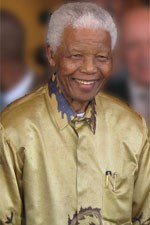
Related
Top stories






More news
















Great leaders do not have to be firebrand orators who make rousing speeches. Few will dispute the leadership credentials of Nelson Mandela, yet he was not a particularly good speaker. To quote from Rick Stengel's book Long Walk to Freedom: "People often tuned out of what he was saying after the first few minutes." What differentiated Madiba as a leader, however, was his authenticity as a person and his moral authority and willingness to stand up and be counted in the face of persecution. He did not blend in, he stood out. But he did not stand out to hog the limelight in search of glory; he stood out as a leader so he could move his followers towards a shared vision and a common goal.
Madiba's leadership approach can be equated to a teabag. Blacky Komani, former CEO of 1time, grew up in a family of seven on a farm where his father was a labourer. He recounts a story his dad told him one night sitting around a fire: "There are three kinds of people in the world: the eggs, the ice cubes, and the teabags. Now close your eyes and imagine the world as a pot full of boiling water. When you put an egg in boiling water, it gets hard. Think of this as people who are hardened by our society; they stop listening, commit crimes, and end up in jail or as dictators like Mugabe. When you put an ice cube in boiling water, it melts, loses its identity, and does not make a difference to the boiling water. Think of this as people who do not stand up for what they believe in, who want to fit in at all costs. But when you put a teabag in boiling water, it changes the colour of the water. What's more, it changes tasteless water into tea, which we all enjoy! Think of people like Nelson Mandela, Archbishop Tutu, FW de Klerk, and the many others who have made a difference in this world. They are people who stood up for what they believed in."

There can be no doubt of Madiba's track record as an outstanding teabag leader. He had the moral conviction and the backbone to stand up for his beliefs. He inspired many generations, from all walks of life, to make a difference to society. He became the benchmark for exemplary political leadership, particularly in the African context where democratically elected leaders who willingly stand down are still a novelty. Maybe we should measure our incumbent president and his ministers against the teabag standard to determine how many eggs, ice cubes and teabags we have in the yet again newly-reshuffled cabinet. Or maybe not, lest we get investigated by the Hawks or fall victim to the type of "you will be dealt with" warning that Kenny Kunene reportedly received for criticising our president.
The effect that a teabag has on boiling water can be reduced to a few basic teabag laws. For starters, the teabag doesn't look the same as the water. It stands out. Real leaders don't lose their identity like an ice cube in a pot of boiling water, or blindly follow the path of least resistance in lockstep with the silent majority. Madiba did not follow the masses nor did he try to imitate another leader. He was - and still is - the real deal: an authentic leader with his own distinctive style and approach.
The second teabag law has to do with substance. A teabag without any substance (tea leaves) cannot infuse boiling water with flavour or colour. Great leaders have substance. They stand for something bigger than themselves. They have a firm set of beliefs and values and a strong vision of a desired future state that they passionately pursue with every fibre of their beings. They live their visions.
The third teabag law has to do with interaction. The tea leaves in the teabag must interact with the boiling water to produce tea. Great leaders realise they can only achieve results through others. In the same way that tea leaves interact with boiling water, great leaders inspire people to move together in the same direction. They attract people around them - people who share the same values, who believe what they believe. And they engage them in a shared experience in order to develop a common vision that will challenge the status quo.
The final teabag law has to do with accountability. Great leaders are prepared to take responsibility for their actions and to be held accountable for the outcome, in the same way that a teabag has to accept responsibility for the flavour of the tea. Madiba never denied his instrumental role in Umkhonto we Sizwe as the armed wing of the ANC during the Rivonia trials. He even ended his defence with the statement that he was "prepared to die" for his ideal of a democratic and free society. Madiba paid a hefty price for his convictions - 27 years in prison.
Madiba's teabag laws for leadership success have all to do with a strong set of values, a firm belief in something bigger than oneself, and the moral conviction to stand up and be counted. To quote Madiba at the 90th birthday celebration of Walter Sisulu: "What counts in life is not the mere fact that we have lived. It is what difference we have made to the lives of others that will determine the significance of the life we lead."